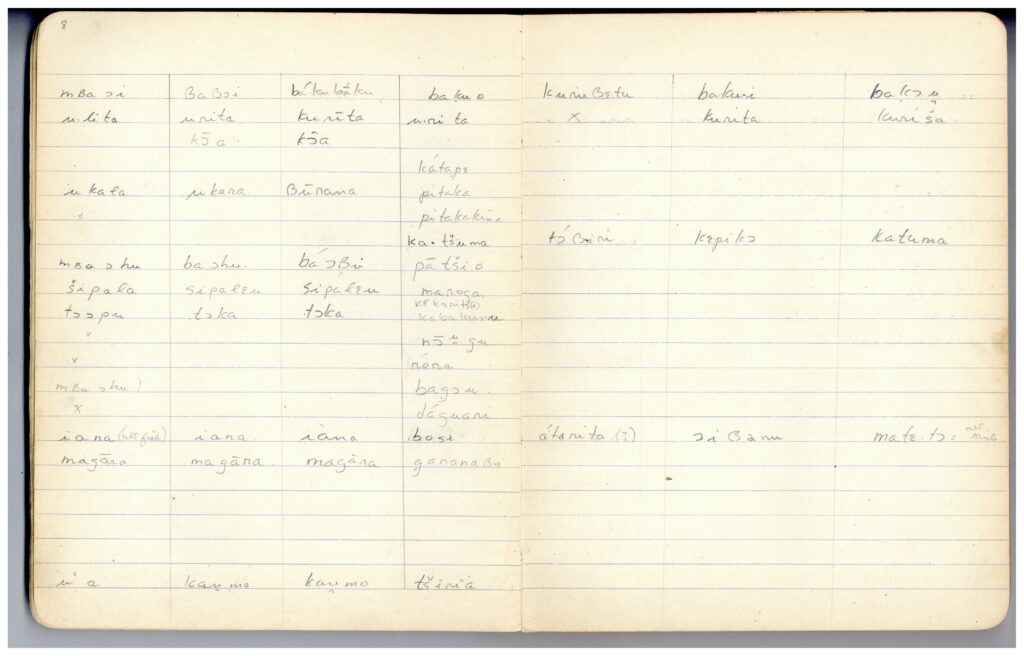This week I received a set of six collections from Masayuki Onishi. Three were from his fieldwork, mainly in Bougainville (with Baitsi, Naasioi, and Motuna (Siwai)), two were his reworking of Douglas Oliver’s records dating back to the 1930s, one in a range of languages, and another on Siwai , and the sixth was from his colleague Kazuya Inagaki on Nagovisi. Masa had followed our guidelines and we had discussed how to create his collections, so he had a spreadsheet of metadata ready and also had prepared the signed deposit forms. All of this meant it took little effort to get his records into PARADISEC. Our catalog imports the spreadsheet and notifies us of any errors in the metadata that we can fix and then reupload. Within a couple of hours of receiving these 1,300 files they had been ingested and were open for users to explore, a testament to our new system that can operate with minimal manual labour.

Douglas Oliver left Masa with the task of editing and archiving his notes, including extensive comparative vocabularies of languages of Bougainville, written in tables in exercise books (as in this image). This collection contains the following items:
•. A collection of 40 recordings of oral tradition.
• A comparative word list of Siwai (Motuna), Kunua (Konua), Nagovisi, Kieta (Naasioi) and Buin. Inculdes the cover (01), contents page (02), followed by 99 pages (03-100) of word lists arranged according to semantic categories.
• A comparative word list of Re’kona (Mono), Torao, Uruava, Banoni, Nasigo (Rotokas), Keriaka and Tapei (Eivo). Inculdes the cover (01), contents page (02), followed by 96 pages (03-98) of word lists arranged according to semantic categories.
• Phoneme inventories of Motuna (01, Nagovisi (02), Naasioi (03), Buin (04), Uruava (05), Torau (07), Konua (13), Keriaka (14), Rotokas (15), Eivo (16), Banoni (17) and Mono (18), with some comments (06, 11).
• 28 pages of grammatical description, mainly of the morphology of the language (03-30).
• Notes on various aspects of Naasioi grammar.
• 26 pages of grammatical description with exemplary short sentences.
• The paradigm of basic kinship terms of Motuna.
• Analysis of Siwai Verb-forms’ in three pages.
Over the past 2 years we have been redeveloping the PARADISEC system for ingesting new files. It now uses Amazon’s S3 and its processing system (lambda) that starts as many processes as it needs, so there is no queue. Previously, we opened a sftp connection to a staging server that held the new items while they were processed: wav files have metadata added to a wrapper to make them BWF files, and an mp3 is generated for delivery; TIF files have a jpg for delivery; movie files are transcoded to mkv and mp4 for delivery. All filenames are checked against our accepted format. All this took time, and items were held in a queue until they had passed through each process. It all happens at once now, with large files (video for example) taking some time to process, but most files going straight in to the collection to be accessed according to the depositor’s intentions.
Funding for this redevelopment work was provided by the ARC LIEF grant Modularised cultural heritage archives – future-proofing PARADISEC (2022-2024). Coding and implementation of the change to our systems is being done by John Ferlito.
 Follow
Follow